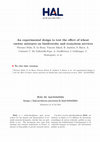Papers by Benjamin Ogechi Agbara
Peter Lang D eBooks, Nov 18, 2021
Peter Lang D eBooks, Nov 18, 2021
Peter Lang D eBooks, Nov 18, 2021
Gospel Characters: Jesus and His Contemporaries contributes to an understanding of Jesus in the N... more Gospel Characters: Jesus and His Contemporaries contributes to an understanding of Jesus in the New Testament that is persons-centred. It highlights how different biblical characters help shape the stories that have come down to us. This book provokes thoughts for further research on other biblical figures and themes. It is an invaluable resource for catechists, pastoral workers, evangelizers and for instructions in Houses of Formation, particularly in furthering the ministry of the Word Made Flesh, who dwells among us.

Website: https://www6.inra.fr/wheatamix The present document details how the Wheatamix consortium... more Website: https://www6.inra.fr/wheatamix The present document details how the Wheatamix consortium, inspired by ecological experiments exploring relationships between plant biodiversity and ecosystem functioning (e.g. the Jena experiment Weisser et al. 2017), selected bread wheat (Triticum aestivum L.) lines, phenotyped them across a range of functional traits and used this information to set up an experimental design able to unravel the effects of variety number and of the functional diversity and identity within variety mixtures for evaluating the impact of intraspecific crop diversity on a range of ecosystem services. Wheat line selection The Wheatamix project investigates the potential benefits of variety mixtures in the Paris basin wheat supply chain, and therefore focuses on varieties and lines adapted to the local climate. A consensus list of 57 wheat lines (Table 1) was thus settled on these grounds and to meet the expectations of agronomists, geneticists, phytopathologists a...

JIT JUNE 2021, VOL. 18, NO.1, 2021
EDITORIAL
As Pope Francis announced a Year of St. Joseph to mark the 150th anniversary of the Sa... more EDITORIAL
As Pope Francis announced a Year of St. Joseph to mark the 150th anniversary of the Saint’s proclamation as patron of the Universal Church, the year began on 8th December, 2020 and would conclude on 8th December, 2021. Given that St. Joseph, the husband of Blessed Virgin Mary and the foster father of Jesus Christ, is famous for being the Ideal Worker who ministered to the Holy Family, the missionary work of the Church must go on despite the COVID-19 pandemic saga. More than fifty years ago, Pope St. Paul VI was emphatic that by now, Africans should be missionaries to themselves. The Church of Christ should truly be pIanted in Africa and they have to make it African through honest and result-oriented dialogue with African cultures and values. Theology should attempt to aid Africans to be truly Christians and authentically Africans (Pope Paul VI, “Address to the Symposium of Episcopal Conferences of Africa and Madagascar, Kampala” 31 July, 1969). Similarly, Alyward Shorter notes that: “Africans have a legitimate desire to reformulate the truths of faith in accordance with their own cultural forms of expression. They need not and should not replicate the intellectual history of Europe in order to understand what the Gospel says about Jesus” (Alyward Shorter, Christianity and African Imagination, Nairobi: Paulines Publications Africa, 1996, 69). Accordingly, efforts have been expended on the reformation and restoration of Inculturation Theology. This edition of the Journal has been put together to help in the theological reforms mandated by the Second Vatican Council. Conscious of this development, the Editorial Board has carefully decided on the peer reviewed array of selected articles.
In this issue of JIT, Benjamin Ogechi Agbara, in his article titled: Formation of a Believing Community as the Role of the First Sign: Insights from John 2:1-12, focuses on the Gospel according to John which was written to evoke faith in Jesus as the Messiah, the Son of God (John 20:30-31). Agbara challenges the Church in Africa to live out the implication of the text and eschew anything that runs contrary to it.
Another biblically oriented article, Rereading Leviticus 19:33-34 in the Context of the Current Global Migrant and Refugee Crisis, by Emmanuel O. Nwaoru, decries the plight of migrants and refugees. Nwaoru, therefore, recommends that the modern society should consider dispassionately the enduring and non-restrictive message and show concern for the wellbeing of every migrant (foreigner) on account of their vulnerability.
The set of articles with sacred liturgical-bent kicks off with the paper by Emmanuel Chinedu Anagwo titled: Understanding the New Translation of the Roman Rite in Igbo Language. The article creates a path to understanding the new translation of the Roman Missal into vernacular. The currency of the paper by Anagwo lies in its wide explanation of some of these new changes which are richer in content in order to redirect towards heaven.
Relatedly, Peter Danjuma Uchu, in his paper, The Importance and Development of the Prayer of Absolution in the African Context, sets out to discuss the spiritual cum liturgical benefits of the prayer of absolution. At the end, Uchu gives some commentaries on the prayer and stresses its importance to the Church in Africa.
In his paper, Underscoring the Essence of Christian Funeral Rites within the Context of ‘Befitting Burial’ in Nigeria, Clement Temitope Ogunlusi laments the extent to which Christians today have deviated from the Biblical virtue of prudence but promote the culture of profligacy in burying the dead. Ogunlusi efficiently argues for Christian befitting burial of Christians to be encouraged in order to serve the spiritual purpose in which the souls of the dead are committed to God’s mercy and the living are consoled as well as the lessons of faith concerning death are learnt.
Charles Boampong Sarfo, in his article, Preface of the Solemnity of Christ the Universal King as Catechesis for Repairing the Fractured African Continent, attempts to understand the expectation of Christians in sharing the truth of God both in practice and in word. Sarfo argued that the need to build a new continent free from corruption, moral lapses and chaos, is possible when Christians in Africa could serve as light and avoid compromising their religious obligations.
The article titled: Dogmatic Theology and the Unity of Christian Doctrine, by Cosmas Okechukwu Ebebe, dares to swim the murky waters with a passion for the protection of the doctrine of the Catholic Church from abuse that comes from subjectivism, rubricism, clericalism, passiveness and conservatism. Ebebe did not shy away from his preference for “Dogmatic Theology” as a better term to be used.
Dogmatic Controversy of the Biblical Passage on Ancestor Veneration in Ibibioland, by Anthony Okon Abel, asserts that ancestor veneration occurs in every culture, all over the world. Abel takes up the task on how to correct the wrong interpretation of some Biblical texts by Ibibio people, who after many years of Christianity still hold that there are some Biblical passages that support ancestral veneration.
The last but not the least is an insightful article by Edward Osang Obi titled: Energy Ethics and the Impact of Climate Change in Sub-Saharan Africa. Anchored on the fact that there is a clear nexus between the onslaught of climate change and the human technological activities. Obi calls for a systematic balance between the natural human need for energy and the levels of environmental destruction permissible in achieving it.
The ideas and experiences captured in this issue of JIT challenge theologians and scholars to be sensitive to the integration of Christian message and culture. The papers, as a whole, significantly contribute to the body of knowledge for Africans and others who need to know the relevance of the mission and vision of Inculturation Theology. It is, therefore, our singular pleasure to recommend this current edition of the Journal to all. You stand to be enriched by reading this issue of JIT as you would not regret doing so.
Emmanuel Chinedu Anagwo
Editor-in-Chief









Uploads
Papers by Benjamin Ogechi Agbara
As Pope Francis announced a Year of St. Joseph to mark the 150th anniversary of the Saint’s proclamation as patron of the Universal Church, the year began on 8th December, 2020 and would conclude on 8th December, 2021. Given that St. Joseph, the husband of Blessed Virgin Mary and the foster father of Jesus Christ, is famous for being the Ideal Worker who ministered to the Holy Family, the missionary work of the Church must go on despite the COVID-19 pandemic saga. More than fifty years ago, Pope St. Paul VI was emphatic that by now, Africans should be missionaries to themselves. The Church of Christ should truly be pIanted in Africa and they have to make it African through honest and result-oriented dialogue with African cultures and values. Theology should attempt to aid Africans to be truly Christians and authentically Africans (Pope Paul VI, “Address to the Symposium of Episcopal Conferences of Africa and Madagascar, Kampala” 31 July, 1969). Similarly, Alyward Shorter notes that: “Africans have a legitimate desire to reformulate the truths of faith in accordance with their own cultural forms of expression. They need not and should not replicate the intellectual history of Europe in order to understand what the Gospel says about Jesus” (Alyward Shorter, Christianity and African Imagination, Nairobi: Paulines Publications Africa, 1996, 69). Accordingly, efforts have been expended on the reformation and restoration of Inculturation Theology. This edition of the Journal has been put together to help in the theological reforms mandated by the Second Vatican Council. Conscious of this development, the Editorial Board has carefully decided on the peer reviewed array of selected articles.
In this issue of JIT, Benjamin Ogechi Agbara, in his article titled: Formation of a Believing Community as the Role of the First Sign: Insights from John 2:1-12, focuses on the Gospel according to John which was written to evoke faith in Jesus as the Messiah, the Son of God (John 20:30-31). Agbara challenges the Church in Africa to live out the implication of the text and eschew anything that runs contrary to it.
Another biblically oriented article, Rereading Leviticus 19:33-34 in the Context of the Current Global Migrant and Refugee Crisis, by Emmanuel O. Nwaoru, decries the plight of migrants and refugees. Nwaoru, therefore, recommends that the modern society should consider dispassionately the enduring and non-restrictive message and show concern for the wellbeing of every migrant (foreigner) on account of their vulnerability.
The set of articles with sacred liturgical-bent kicks off with the paper by Emmanuel Chinedu Anagwo titled: Understanding the New Translation of the Roman Rite in Igbo Language. The article creates a path to understanding the new translation of the Roman Missal into vernacular. The currency of the paper by Anagwo lies in its wide explanation of some of these new changes which are richer in content in order to redirect towards heaven.
Relatedly, Peter Danjuma Uchu, in his paper, The Importance and Development of the Prayer of Absolution in the African Context, sets out to discuss the spiritual cum liturgical benefits of the prayer of absolution. At the end, Uchu gives some commentaries on the prayer and stresses its importance to the Church in Africa.
In his paper, Underscoring the Essence of Christian Funeral Rites within the Context of ‘Befitting Burial’ in Nigeria, Clement Temitope Ogunlusi laments the extent to which Christians today have deviated from the Biblical virtue of prudence but promote the culture of profligacy in burying the dead. Ogunlusi efficiently argues for Christian befitting burial of Christians to be encouraged in order to serve the spiritual purpose in which the souls of the dead are committed to God’s mercy and the living are consoled as well as the lessons of faith concerning death are learnt.
Charles Boampong Sarfo, in his article, Preface of the Solemnity of Christ the Universal King as Catechesis for Repairing the Fractured African Continent, attempts to understand the expectation of Christians in sharing the truth of God both in practice and in word. Sarfo argued that the need to build a new continent free from corruption, moral lapses and chaos, is possible when Christians in Africa could serve as light and avoid compromising their religious obligations.
The article titled: Dogmatic Theology and the Unity of Christian Doctrine, by Cosmas Okechukwu Ebebe, dares to swim the murky waters with a passion for the protection of the doctrine of the Catholic Church from abuse that comes from subjectivism, rubricism, clericalism, passiveness and conservatism. Ebebe did not shy away from his preference for “Dogmatic Theology” as a better term to be used.
Dogmatic Controversy of the Biblical Passage on Ancestor Veneration in Ibibioland, by Anthony Okon Abel, asserts that ancestor veneration occurs in every culture, all over the world. Abel takes up the task on how to correct the wrong interpretation of some Biblical texts by Ibibio people, who after many years of Christianity still hold that there are some Biblical passages that support ancestral veneration.
The last but not the least is an insightful article by Edward Osang Obi titled: Energy Ethics and the Impact of Climate Change in Sub-Saharan Africa. Anchored on the fact that there is a clear nexus between the onslaught of climate change and the human technological activities. Obi calls for a systematic balance between the natural human need for energy and the levels of environmental destruction permissible in achieving it.
The ideas and experiences captured in this issue of JIT challenge theologians and scholars to be sensitive to the integration of Christian message and culture. The papers, as a whole, significantly contribute to the body of knowledge for Africans and others who need to know the relevance of the mission and vision of Inculturation Theology. It is, therefore, our singular pleasure to recommend this current edition of the Journal to all. You stand to be enriched by reading this issue of JIT as you would not regret doing so.
Emmanuel Chinedu Anagwo
Editor-in-Chief
As Pope Francis announced a Year of St. Joseph to mark the 150th anniversary of the Saint’s proclamation as patron of the Universal Church, the year began on 8th December, 2020 and would conclude on 8th December, 2021. Given that St. Joseph, the husband of Blessed Virgin Mary and the foster father of Jesus Christ, is famous for being the Ideal Worker who ministered to the Holy Family, the missionary work of the Church must go on despite the COVID-19 pandemic saga. More than fifty years ago, Pope St. Paul VI was emphatic that by now, Africans should be missionaries to themselves. The Church of Christ should truly be pIanted in Africa and they have to make it African through honest and result-oriented dialogue with African cultures and values. Theology should attempt to aid Africans to be truly Christians and authentically Africans (Pope Paul VI, “Address to the Symposium of Episcopal Conferences of Africa and Madagascar, Kampala” 31 July, 1969). Similarly, Alyward Shorter notes that: “Africans have a legitimate desire to reformulate the truths of faith in accordance with their own cultural forms of expression. They need not and should not replicate the intellectual history of Europe in order to understand what the Gospel says about Jesus” (Alyward Shorter, Christianity and African Imagination, Nairobi: Paulines Publications Africa, 1996, 69). Accordingly, efforts have been expended on the reformation and restoration of Inculturation Theology. This edition of the Journal has been put together to help in the theological reforms mandated by the Second Vatican Council. Conscious of this development, the Editorial Board has carefully decided on the peer reviewed array of selected articles.
In this issue of JIT, Benjamin Ogechi Agbara, in his article titled: Formation of a Believing Community as the Role of the First Sign: Insights from John 2:1-12, focuses on the Gospel according to John which was written to evoke faith in Jesus as the Messiah, the Son of God (John 20:30-31). Agbara challenges the Church in Africa to live out the implication of the text and eschew anything that runs contrary to it.
Another biblically oriented article, Rereading Leviticus 19:33-34 in the Context of the Current Global Migrant and Refugee Crisis, by Emmanuel O. Nwaoru, decries the plight of migrants and refugees. Nwaoru, therefore, recommends that the modern society should consider dispassionately the enduring and non-restrictive message and show concern for the wellbeing of every migrant (foreigner) on account of their vulnerability.
The set of articles with sacred liturgical-bent kicks off with the paper by Emmanuel Chinedu Anagwo titled: Understanding the New Translation of the Roman Rite in Igbo Language. The article creates a path to understanding the new translation of the Roman Missal into vernacular. The currency of the paper by Anagwo lies in its wide explanation of some of these new changes which are richer in content in order to redirect towards heaven.
Relatedly, Peter Danjuma Uchu, in his paper, The Importance and Development of the Prayer of Absolution in the African Context, sets out to discuss the spiritual cum liturgical benefits of the prayer of absolution. At the end, Uchu gives some commentaries on the prayer and stresses its importance to the Church in Africa.
In his paper, Underscoring the Essence of Christian Funeral Rites within the Context of ‘Befitting Burial’ in Nigeria, Clement Temitope Ogunlusi laments the extent to which Christians today have deviated from the Biblical virtue of prudence but promote the culture of profligacy in burying the dead. Ogunlusi efficiently argues for Christian befitting burial of Christians to be encouraged in order to serve the spiritual purpose in which the souls of the dead are committed to God’s mercy and the living are consoled as well as the lessons of faith concerning death are learnt.
Charles Boampong Sarfo, in his article, Preface of the Solemnity of Christ the Universal King as Catechesis for Repairing the Fractured African Continent, attempts to understand the expectation of Christians in sharing the truth of God both in practice and in word. Sarfo argued that the need to build a new continent free from corruption, moral lapses and chaos, is possible when Christians in Africa could serve as light and avoid compromising their religious obligations.
The article titled: Dogmatic Theology and the Unity of Christian Doctrine, by Cosmas Okechukwu Ebebe, dares to swim the murky waters with a passion for the protection of the doctrine of the Catholic Church from abuse that comes from subjectivism, rubricism, clericalism, passiveness and conservatism. Ebebe did not shy away from his preference for “Dogmatic Theology” as a better term to be used.
Dogmatic Controversy of the Biblical Passage on Ancestor Veneration in Ibibioland, by Anthony Okon Abel, asserts that ancestor veneration occurs in every culture, all over the world. Abel takes up the task on how to correct the wrong interpretation of some Biblical texts by Ibibio people, who after many years of Christianity still hold that there are some Biblical passages that support ancestral veneration.
The last but not the least is an insightful article by Edward Osang Obi titled: Energy Ethics and the Impact of Climate Change in Sub-Saharan Africa. Anchored on the fact that there is a clear nexus between the onslaught of climate change and the human technological activities. Obi calls for a systematic balance between the natural human need for energy and the levels of environmental destruction permissible in achieving it.
The ideas and experiences captured in this issue of JIT challenge theologians and scholars to be sensitive to the integration of Christian message and culture. The papers, as a whole, significantly contribute to the body of knowledge for Africans and others who need to know the relevance of the mission and vision of Inculturation Theology. It is, therefore, our singular pleasure to recommend this current edition of the Journal to all. You stand to be enriched by reading this issue of JIT as you would not regret doing so.
Emmanuel Chinedu Anagwo
Editor-in-Chief